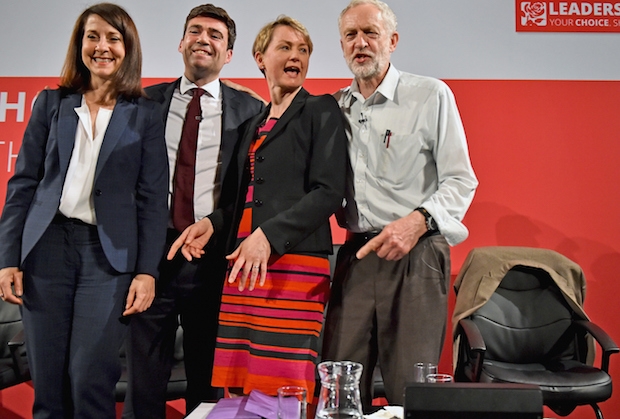The Labour leadership contest has taken so many odd turns already that a few more might return it to a vague normal track. But with Jeremy Corbyn announcing last night that he thought Tony Blair could be tried for war crimes over Iraq, and Andy Burnham appearing to tack left on rail re-nationalisation, there are still a few turns to go. Here’s where each of the campaigns have got to:
Jeremy Corbyn
The frontrunner, miles ahead in all published polling and constituency party nominations, and capable of summoning good crowds to his rallies, or at least to peer excitedly through the windows at his rallies. Last night Corbyn told Newsnight that Blair could be tried for war crimes, saying: ‘If he has committed a war crime, yes. Everybody who has committed a war crime should be.’ He added:
‘It was an illegal war. I am confident about that. Indeed Kofi Annan confirmed it was an illegal war and therefore [Blair] has to explain to that. Is he going to be tried for it? I don’t know. Could he be tried for it? Possibly.’
Now, Corbyn has been saying this kind of stuff for years, but from the backbenches, not as a candidate to lead the party. Just two leaders would stand between him and the man he thinks could be tried for war crimes. That he thinks it is a good plan to continue making these comments during a leadership contest shows how far apart the poles are within the Labour party – and how difficult it will be to pull those poles back together. Corbyn last night said ‘you have to live with that diversity of opinion’ when asked whether he’d be happy as leader for his MPs to rebel against the party line.
Yvette Cooper
Now pulling ahead of Andy Burnham and bolstered by the big name endorsement of Alan Johnson yesterday. Cooper has run a tortoise-style campaign, plodding along without making too much noise, but now she’s starting to overtake the hare-like Burnham just as the ballot papers are being printed, ready to be sent out next week.
Cooper’s allies believe that her behaviour over the Welfare Bill, in which she spoke up early in Shadow Cabinet for a tougher stance from the leadership towards the legislation in the form of a reasoned amendment, but didn’t cause a fuss in the media, has helped.
Andy Burnham
In contrast to Cooper, Burnham has suffered as a result of the row on the Welfare Bill. He too was in favour of a reasoned amendment, but he went far beyond the line that Cooper took, leaving Shadow Cabinet to go to a lunch of Westminster journalists at which he declared that the legislation was ‘unsupportable’ and joked about ‘George and Harriet’s two-child test’, before voting with the leadership on the legislation anyway.
Now he is pledging to re-nationalise the railways ‘line by line’ if he becomes Labour leader again, which is a significant shift from his comments so far in interviews and at hustings where he has argued that public options should have been included in the bidding processes for franchises. This suggests that Burnham is trying to recapture ground lost to Corbyn. Yesterday he gave an interview about his ‘vision’, which was clearly an attempt to show that the Islington North MP isn’t the only one full of belief in this campaign.
On Woman’s Hour this morning, Burnham described his vision as ‘radical’. He needs to persuade the members who are attracted by Corbyn’s certain way of speaking about policy in order to keep them on his side.
Liz Kendall
Operating at a lower volume now, the candidate expected to come fourth launched a series of extremely vague-sounding ‘causes’ which might have been engraved on a large stone before the election. Her allies feel that the lack of support for Kendall has three main causes: the first is that the party electorate does not seem to be as keen for radical change as it did in the days after it lost the general election; the second is that even if those members were keen for change, the ‘Blairite’ tag is just too off-putting, and the third is that Kendall has got a few too many advisers around her. There was a desire to deal with her rough edges that she displayed in the first few weeks, but Kendall supporters worry that too many cooks have produced froth, rather than substance.







Comments